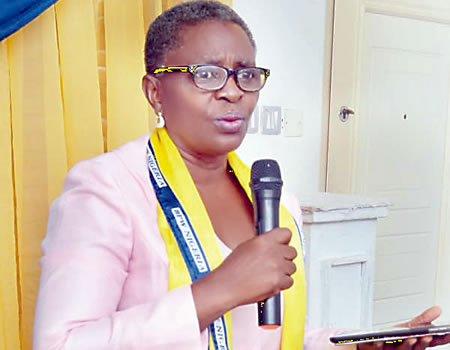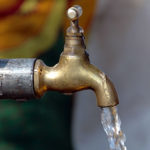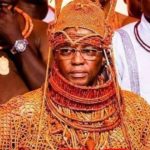Yinka Ajibola is the Chief Executive Officer of Gilgal, an educational consult, and national president of Business and Professional Women. In this interview by TAYO GESINDE, she speaks about her passion for women and the girl-child, among other issues.
What is it like working with women?
It has been exciting. It has been demanding, but it has been a great opportunity to serve and to also mobilise women in BPW and many of them have great potential. So, it has been a great opportunity to mobilise and empower them and other women too.
Let’s also talk about some of the programmes and projects that you have carried out
BPW Nigeria coordinates all the other clubs but we have also done some projects too. One big one which we had in 2019 was the Medical Mission. We had the opportunity to partner with ANPA (Association of Nigerian Physicians in America) to carry out a big medical mission.
It was free health services, free surgeries for about six days in six rural locations in Abuja. It was big and the Federal Government was involved and we had some other organisations like Dagomo, JCI and quite a number of other organisations partnering to do this.
There were many positive results from that encounter. Many people who would never have had the opportunity to get this surgery done were able to do it for free. There are some testimonies that are just mind-blowing from the event that we had. It was also a great opportunity for us in Nigeria to see how doctors across the world work with passion. Yes, we know that there are limited resources for our doctors. When you see the way people from other countries work, then we have a lot to learn from them.
Bayelsa poll: NGO decries tense political atmosphere, sues for restraint
Let’s talk about your passion for the girl-child education
BPW has great passion for education and that informed our decision to build two standard schools which we eventually donated to government. It is not solely for the girl-child but at least a high percentage of children there are girls. In one of the schools we have well over a thousand from primary to secondary schools.
We go there continuously to support them, especially the girls in the provision of facilities, opening their eyes, mentoring and other things. Also, our Young BPW partnered with Tabitha Foundation to get some of the out-of-school pupils, especially those who got pregnant back to school. So, that is another partnership that we are involved in. At the various clubs which are spread across the country, a lot of programmes and activities are going on simultaneously.
You also had a programme with PPFN recently, tell us about it
Empowerment is the key thing that BPW does and we do so in different areas like education, creating awareness about their health and making sure that they do something positive with it. Recently, we had collaboration with Planned Parenthood Federation of Nigeria (PPFN). That is something that we have always done in the organisation. Five years ago, we created awareness about cervical cancer. We picked cervical cancer because it is one of the cancers that you can deal with and stop once you identify.
This time round, we started in Abuja, created awareness and we mobilised all our women to go for the cancer screening. Also, where they were positive, we had them go through treatment. We also used the opportunity to encourage women to do tests in other things and the experience helps women to understand the issues and PPFN was very supportive.
Your national convention is around the corner, what should Nigerian women expect
This year’s national convention is going to be an exciting one. The theme for this year is, ‘Women in Nigerian Politics: Yesterday, Today and Tomorrow’. We all know that Nigerian women are not doing well at all. This is in terms of participation in politics especially in the last elections.
It was very bad, the percentage of women representatives dropped.
We call ourselves the giant of Africa but our performance in quite a number of areas does not show that. Rwanda is one of the best, when you talk about political participation. Namibia is also doing very well. BPW is an advocacy group and what we are doing together is to share experience, share ideas and to make advocacy for women in politics.
What are the challenges? What are we supposed to do that we are not doing?
We need to move forward and that is why we are having the discussions this year. We are hoping that it will be a continuous discussion such that in 2023, the story will change. So, it is the beginning of many more discussions that we are engaging in. We are bringing together government, the parties and other stakeholders. The political parties have a big role to play in all these.
We are bringing those who succeeded, those who got appointive positions and those who did not succeed.
If you have to advise government about women’s participation in politics, what would you say?
I will start with the parties because in Namibia, it is the party policy that has helped to lift the percentage of women in politics. For example, what we are having in Kwara State now, it was the party that decided to put more women in offices. Government needs to adopt that.
What have you done in terms of grooming women for entrepreneurship?
Economic empowerment is key. We have many programmes, much training. Many time, we bring people together and create opportunities for women to empower themselves, either through acquiring financial skill, ICT skills and other skills that would all culminate in the improvement of their businesses.
We got a rice mill from the Federal Government and we situated the mill in Enugu. It is nice that we went into such a business because we faced challenges that ordinary people face in business. We were expecting that in one or two years, the mill would be up and doing.
However, we have had challenges, we are not giving up. I am sure that in the next one year, we would be able to say something positive about it. For now, we are resolving quite a number of the challenges that we have faced.
BPW has consultative status with the United Nations, what are the benefits for your members?
One thing we have here is the power of collaborations, learning from other parts of the world, we meet people in government, NGOs and donor agencies to share experiences and ideas. Thereafter, we develop programmes based on what we learn from the Commission on the Status of Women (CSW). There is usually a lot of take home; it is indeed a learning field. In addition, we also find out that nothing is new. There are problems that they are having here that they are also having in other parts of the world. Usually, when you see the way other people have solved their problems, it helps you to have solutions to yours.
For example, right now through the CSW, we have opportunities in funding, we shared the idea and some people have done the project.
Towards the end of the year your organisation undertakes CSR across the country, what inspired this?
We believe that December which is Christmas time and end of the year is the best time to touch lives. There are so many people that do not enjoy that period because of so many reasons. Number one is that they do not have the financial ability, they do not have family and there is nothing around them that gives them joy. So, this is the time that we tell our clubs to touch lives and bring smiles to their faces. We do this in various ways like going to schools, rural locations to give food, organise parties or pay hospital bills for those who do not have the resources.
WATCH TOP VIDEOS FROM NIGERIAN TRIBUNE TV
- Let’s Talk About SELF-AWARENESS
- Is Your Confidence Mistaken for Pride? Let’s talk about it
- Is Etiquette About Perfection…Or Just Not Being Rude?
- Top Psychologist Reveal 3 Signs You’re Struggling With Imposter Syndrome
- Do You Pick Up Work-Related Calls at Midnight or Never? Let’s Talk About Boundaries






